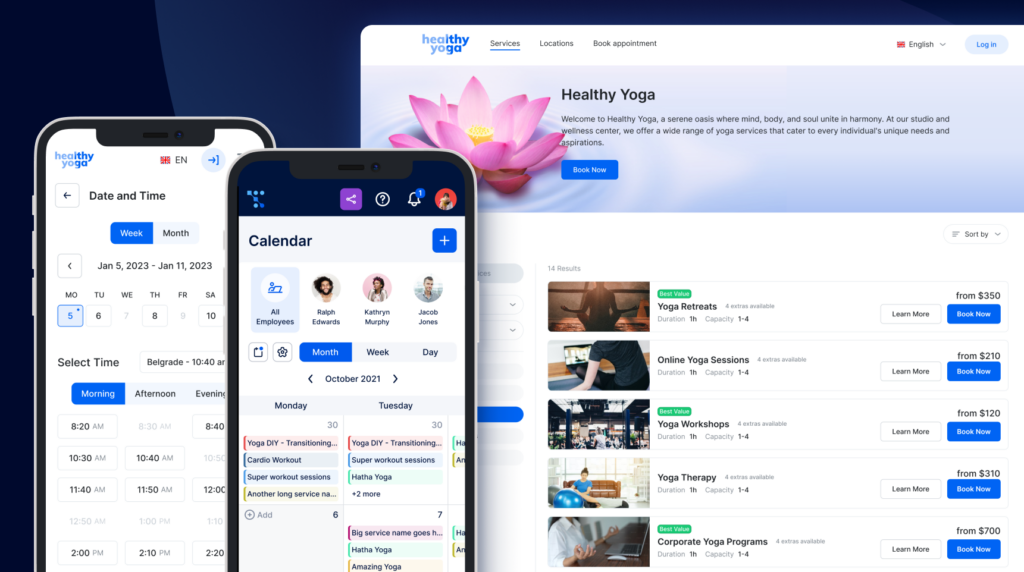Online consulting might not have crossed your mind as a potential profession, but it remains one of the most lucrative avenues for earning money on the internet. If you’ve honed a sought-after skill, possess expertise, and are open to offering advice, the possibilities are boundless. Seize the opportunity to leverage your skills and discover platforms where you can actively contribute to assisting others.
In today’s competitive marketplace, there are a lot of business owners who need a specialist who can resolve the specific issues they have. And as the internet can connect us no matter where we are located, they usually look for professional online consulting companies that can offer solutions.
An increasing number of people are going all-in as self-employed consultants, and it is a popular move for people from different industries.
In the past, this option was more available to senior managers who took early retirement and had significant experience. However, there are now more opportunities than ever, and individuals should take advantage of them.
So, what does it take to become a serious online consulting freelancer, and what is the best strategy to help you do so?
Let’s find out!
What Is Online Consulting?
Online consulting is a dynamic and evolving field that leverages digital platforms to provide expert advice, guidance, and solutions to individuals or businesses. In essence, it’s the virtual counterpart of traditional consulting, but with the flexibility and accessibility that the internet offers.
Online consulting, also known as e-consulting or virtual consulting, involves delivering professional services and advice through digital channels. This can encompass a wide range of expertise, including but not limited to business consulting, marketing strategy, financial planning, career counseling, and more.
A consultant is an individual who offers professional advice regarding a specific niche. Basically, they are service providers to other businesses and people, and they help by providing value coming from their extensive experience. The only difference between online and traditional consulting is that an online consultant does the same things as a normal one, but the medium that they use is digital.
Also, people often confuse consulting with coaching, and these two things are quite different.
Coaching implies asking questions to help people figure out their issues themselves while consulting brings all the information in front of people.
Online consulting is a broad term, and it can cover many different jobs. Jobs like this appear often, simply because the market needs them. Today, anybody who has some decent knowledge of a particular topic can become a consultant in that niche.
What Does an Online Consultant Do?
An online consultant plays a crucial role in providing expert advice, solutions, and guidance to clients through digital channels. The scope of their work can vary widely depending on their specialization, but here are some common aspects of what an online consultant does:
- Expert advice and analysis
Online consultants analyze clients’ needs, challenges, and goals to understand the context of their situation. They provide informed insights and advice based on their expertise in a particular field, whether it’s business, marketing, technology, finance, or another area.
- Strategic planning
Consultants help clients formulate strategic plans to achieve their objectives, whether it’s improving business processes, increasing online visibility, or enhancing overall performance.
- Implementation support
Consultants assist in implementing recommended strategies, providing step-by-step guidance to ensure effective execution. They address challenges and obstacles that may arise during the implementation phase, offering solutions to keep the process on track.
- Digital communication
Online consultants use digital communication tools like video calls, emails, and instant messaging to communicate with clients, fostering a collaborative and efficient working relationship.
- Data analysis and reporting
Depending on the nature of the consultation, consultants may analyze data to provide evidence-based recommendations and measure the success of implemented strategies. They create reports to update clients on progress, key metrics, and any adjustments needed to optimize outcomes.
- Client education
Consultants aim to empower clients by sharing knowledge and skills, enabling them to make informed decisions independently.
- Continuous learning
Given the dynamic nature of many fields, online consultants invest in continuous learning to stay updated on industry trends, best practices, and emerging technologies.
- Marketing and branding assistance
Consultants may assist clients in enhancing their online presence, optimizing websites, and developing effective digital marketing strategies.
- Networking and collaboration
Consultants often engage in networking activities to build professional connections, collaborate with other experts, and expand their client base.
How Do You Start an Online Consulting Business?
Starting an online consulting business involves careful planning, strategic decision-making, and effective implementation. Here’s a step-by-step guide to help you kickstart your online consulting venture:
Identify your niche
Define your area of expertise and identify a specific niche within your field. Specializing allows you to target a specific audience and stand out in a competitive market.
Conduct market research
Research your target audience, competitors, and industry trends. Understand the needs and challenges of your potential clients to tailor your services accordingly.
Build a strong online presence
Create a professional website that reflects your expertise and showcases your services. Optimize it for search engines (SEO) to enhance visibility. Develop a compelling personal brand across social media platforms. Use LinkedIn, Twitter, and other relevant channels to share valuable content and connect with potential clients.
Define your services and pricing
Clearly define the services you offer and establish a transparent pricing structure. Consider offering different packages to cater to various client needs.
Set up legal and financial foundations
Register your business and obtain any necessary licenses or permits. Set up a separate business bank account to keep your personal and business finances separate.
Consult with a legal professional to ensure you comply with regulations and to draft contracts for your consulting services.
Invest in technology
Choose reliable communication tools for virtual meetings, such as video conferencing platforms, AI note-taking tools and collaboration software. Implement a secure payment system to facilitate transactions with clients.
Create a marketing strategy
Develop a marketing plan to promote your consulting services. Utilize content marketing, social media, and email campaigns to reach your target audience.
Consider offering free webinars, workshops, or downloadable resources to showcase your expertise and attract potential clients.
Network and build relationships
Attend virtual networking events, join industry forums, and connect with professionals in your field. Building a strong network can lead to referrals and collaborations. Leverage your existing connections and ask for testimonials from previous clients.
Offer free consultations
Initially, consider offering free consultations to showcase your expertise and build trust with potential clients. Use these sessions to understand their needs and demonstrate the value you can provide.
Collect and showcase testimonials
Encourage satisfied clients to provide testimonials. Display these on your website to build credibility and trust among potential clients.
If you need a more comprehensive guide to starting an online consulting business, we’ve got you covered!
Is Starting an Online Consulting Business Profitable?

The profitability of an online consulting business can vary based on factors such as your niche, expertise, marketing strategy, and the demand for your services. Many successful consultants find online consulting to be a lucrative venture, but success often requires careful planning and dedication. Here are some considerations regarding profitability and the initial costs associated with starting a consulting business:
- Low overhead costs
One of the advantages of online consulting is the potential for lower overhead costs compared to traditional brick-and-mortar businesses. You may not need to invest in physical office space, utilities, or other associated expenses.
- Global reach
Online consulting allows you to reach a global audience, expanding your client base and potential revenue streams.
- Scalability
As you establish your reputation and client base, there is the potential to scale your business by offering additional services, creating new revenue streams, or increasing your rates.
- Flexibility
The flexibility of online consulting can allow you to manage your time effectively, potentially taking on multiple clients or diversifying your services.
- Recurring revenue
Depending on your consulting model, you may be able to establish recurring revenue through retainer agreements, subscription services, or ongoing client relationships.
How Much Money Do You Need to Start a Consulting Business?
Initial costs of online consulting business:
- Website and online presence
Creating a professional website is essential. Costs can include domain registration, website hosting, and potentially hiring a web designer or using website-building platforms.
- Technology and tools
Invest in reliable communication tools, project management software, and any other technology required for virtual consultations. Many tools offer free or affordable plans to start.
- Marketing and branding
Allocate a budget for marketing activities, including social media advertising, content creation, and potentially paid advertising to increase your online visibility.
- Legal and licensing fees
Depending on your location and industry, you may need to pay for business registration, licenses, and legal consultations to ensure compliance.
- Professional development
Budget for ongoing professional development and training to stay current in your field and maintain a competitive edge.
- Networking and events
Attend virtual networking events, webinars, and conferences. While some may be free, others may have registration fees.
- Insurance
Consider obtaining professional liability insurance to protect your business in case of any legal issues.
- Miscellaneous expenses
Factor in miscellaneous expenses such as office supplies, internet costs, and any other incidental costs associated with running a business.
The initial costs can vary widely, and many consultants start with a lean budget, gradually reinvesting profits into the business as it grows. It’s crucial to conduct a detailed business plan and budgeting process to estimate your specific needs accurately. While there are upfront costs, the potential for profitability makes starting an online consulting business an attractive option for many professionals.
What Kind of Communication Does an Online Consultant Use?
One of the key aspects of online consulting is the use of technology to facilitate communication. Consultants interact with their clients through various online tools such as video calls, emails, instant messaging, and collaborative platforms. This eliminates the constraints of geographical boundaries, allowing consultants to work with clients from around the world.
- Video calls are the standard way of communicating, as it allows for face-to-face interaction.
- A live chat plugin is a great option where you can exchange any messages.
- Group calls are also needed especially when there are multiple clients at the same time.
- Transferring files that contain essential information to clients and the other way around.
- Screencasts are useful when the computer screen is shared during consultations (works excellent in webinars).
- Scheduling software for consultants to accept payments, show availability, schedule appointments, group bookings and even set up recurring appointments and take customer notes.
How to Offer Excellent Online Consulting Today?
Choose your niche

When you are at the beginning of your online consulting career, you need to first establish your niche. Make decisions and choose the target market. It is essential to know the ideal clients you are trying to reach. Ask yourself if you want to offer your services to individuals, teams, or entire companies. Go for the market that needs your expertise the most, as jobs will be readily available.
Selling knowledge online can be done quickly and easily, which is why there are also cases of people trying to sell services that they actually know little about. To be successful, however, you need to have real experience.
Here are some questions that can help you become a better online consulting:
- What kind of services are not available in your industry?
- What are the problems that people struggle the most?
- What are the most significant opportunities, and where can they be found?
- What makes your services different?
- Who is the ideal client?
- Who is going to benefit the most from what you are offering?
Setting up your platform
As there are many consulting jobs available online, this means there is also a high demand across different domains. The internet gave a significant boost to consulting businesses because consultants now can work globally. This fact also brought some new marketplaces that can help people with their independent consulting jobs.
Freelance marketplaces are a great place to go if you want to set up your profile. These marketplaces are sometimes known for being paid low rates, however, there are great opportunities as well.
An important aspect that you should consider is Google. If people type your name in the search engine, you want them to find your profile and website. So, be sure to put all important, relevant information about yourself, your career, and the online consulting niche you have chosen.
Create a pricing structure
When you decide to start an online consulting business, one of the more difficult steps is going to be choosing your pricing. Choosing the right fees for your services can be challenging, but you can try different options.
A good option to start with is charging a fixed project rate, which sets the price for a pre-determined work product. The second option is hourly billing. What is useful with an hourly billing rate is that it lets your clients estimate the number of hours it takes to complete a work product.
Both options help both parties to know what kind of budget should be expected from the collaboration. However, the advantage of charging by the hour is that it is going to be easier to explain how changing or adding work is going to increase the number of hours needed.
Market your services
Making people aware of your services is going to transform your idea into a real business. There are some steps to that like getting a serious consultant business name and creating a website.
After that, if you believe that you have the needed experience, then it is time to start the marketing process. What is significant is that you do not even have to leave your home to do this.
Customers are not going to want to pay for advice and help from an average individual. They want experience and expertise, as well as a proven track record of success. Creating your brand by positioning yourself as an expert is vital in the industry. To do so, try giving some of your advice for free to start.
You should create a coherent content strategy for sharing information across different channels. One way to do this is by creating articles or videos where you talk about different tips in your niche. By offering these tips, it will help you gain exposure and gain more insights. Send out this high-quality content and see what happens. You can also compile valuable consultation resources into an online courses and weigh your choice of e-learning publicity between Kajabi vs Teachable.
If your advice and tips prove successful and useful, people are going to want to work with you. Future steps might include creating your book, developing courses, and so on. When you are seen as an authority and expert, your chances of being hired are going to be more significant.
Find online consulting jobs

When you decide to start your online consulting business, your biggest goal will be to get clients. At the start, this will be a big challenge, but with patience and hard work, anything can be achieved.
Finding support from your contacts and taking advantage of the many online resources, together with freelancer work platforms with consulting jobs, will help you establish yourself and build your career. You will also want to pick up as many projects as possible to build that important portfolio.
A great idea when starting is to join a more prominent consultancy organization. The advantage here is that the organization is already visible, and you may be able to get quicker projects. Just be aware of the terms and conditions that organizations like this ask from you.
How Much Can You Win From Online Consulting?
Online consulting may be a profession that you have not considered before, but consulting is still one of the best ways to make money online. If you have mastered a skill that is in demand, and you are knowledgeable and willing to advise, then there is nothing stopping you. You can take advantage of these skills and find a place where you can start doing things to help others.
Online consulting is very profitable in today’s market. On average, people who are new to consulting jobs can ask for around $15 per hour, while some consultants may go for $50 per hour, and others may ask for $500 per hour or more. Online consulting jobs do not have a steady rate, but picking a fair, competitive fee is important until you build a successful consulting business.
In conclusion, choosing your online consulting rate depends on the level of expertise and what niche you are addressing. With some research, you can find for sure different consultants and check what their offers are. In the end, go with the rate that sounds fair for the work you do online.
3 Must-Have Online Consulting Software
As an online consultant, you need tools to help you automate processes in your consulting business. But the goal is to not get overwhelmed, while you still have all the functionalities you need to run your business smoothly. We’ve prepared a list of the top 3 must-have business consulting software you need:
Scheduling software for consultants
If you’re looking for the best and most comprehensive appointment scheduling software for consultants based on customer reviews, feature-to-cost ratio, customization, and flexibility it’s definitely Trafft.
Trafft offers a range of basic and advanced features designed to streamline scheduling, gather essential business metrics, create high-converting booking websites, and optimize repetitive tasks, all while ensuring a seamless and efficient user experience. Trafft’s platform is designed to minimize errors, leaving no room for no-shows or double bookings. This reliability ensures that your schedule remains organized and efficient.
When it comes to advanced features, you’ll enjoy plenty of them, including multi-location scheduling, multi-language capabilities, recurring appointments, group bookings, easy rescheduling, appointment reminders and templates, and highly customizable booking forms with templates. These features enhance the functionality and flexibility of the platform.
What are other advanced features Trafft offers?
- Powerful integrations with popular tools like MailChimp, Google Analytics, Stripe, PayPal, and Zapier. It also offers native integrations with Zoom and Google Meet for scheduling virtual meetings.
- Trafft provides insightful business dashboards, allowing you to gather essential metrics that can inform your business and marketing efforts. These insights are valuable for making data-driven decisions.
- Extras for extra boost in revenue
- Customer notes to improve customer experience
- Integrated payment processing ensures that you always get paid on time, whether it’s after the appointment or in advance. This feature is vital for financial management and reducing the risk of no-shows.
- You can choose how to share your booking page, whether it’s through a booking QR code, an embeddable form on your website, or via a simple link.
Trafft’s extremely feature-rich, allowing you to run and grow your consulting business with ease. You won’t break the bank either, as Trafft’s plans are tailored to fit the needs and budgets of all service businesses. They also offer an unparalleled free plan with superior features that you can’t find anywhere else.
Pricing: Free for up to 5 members; paid plans start from $29 per month.
Sign up for Trafft for free now and see why it’s the best scheduling software for consultants to help you supercharge your business growth!
Video conferencing tool for consultants
Online consultants leverage video conferencing tools like Zoom for several compelling reasons. Zoom is a great choice because it provides a seamless and user-friendly platform for virtual meetings, making it easy for both consultants and clients to connect regardless of their location. The intuitive interface allows for quick and hassle-free entry into meetings, with participants needing only a link to join. This ease of use contributes to a positive client experience, reducing potential technological barriers that might hinder effective communication. Moreover, Zoom’s versatile features, including high-quality video and audio, screen sharing, and breakout rooms, empower consultants to conduct interactive and collaborative meetings, replicating the dynamic nature of in-person consultations.
Zoom also offers a robust and secure environment, addressing key concerns for consultants dealing with sensitive information. The platform has implemented various security measures, such as meeting passwords, waiting rooms, and end-to-end encryption, ensuring the confidentiality and privacy of client discussions. This commitment to security is crucial for consultants working across diverse industries where confidentiality and data protection are paramount. Additionally, Zoom’s recording capabilities enable consultants to archive sessions for future reference or for clients who may have missed a meeting, enhancing documentation and reinforcing transparency.
Client relationship management tool for consultants
Teamgate is an excellent client relationship management (CRM) tool that proves to be indispensable for consultants aiming to enhance their business operations. Functioning as a Sales CRM, Teamgate offers a myriad of impressive features tailored to meet the unique needs of business consultants. One standout aspect is its seamless integration with a range of essential tools and platforms, including Zendesk, Mailchimp, Zapier, and Quickbooks. This integration ensures a smooth workflow, allowing consultants to consolidate their efforts and streamline client-related tasks efficiently.
One of the key strengths of Teamgate lies in its ability to facilitate comprehensive client management. By leveraging this CRM, consultants can effortlessly keep track of their clients’ interactions, engagements, and preferences. This not only enhances the overall client experience but also empowers consultants to make informed decisions based on a deeper understanding of their clients’ needs. As consultants well know, repeat customers are the backbone of success in the industry, and Teamgate provides the tools necessary to nurture and maintain these crucial client relationships. With the ability to centralize client data, consultants can optimize their strategies for business expansion and capitalize on the software’s features to cultivate lasting and fruitful partnerships. In essence, Teamgate proves to be a valuable asset for consultants seeking an efficient and feature-rich solution for client relationship management.
FAQs About Online Consulting
1. How do I establish credibility as an online consultant?
Building a strong online presence through a professional website, testimonials, and a well-crafted LinkedIn profile can help establish credibility.
2. What tools and platforms are essential for online consulting?
Utilizing video conferencing tools (e.g., Zoom), project management software (e.g., Asana), and communication platforms (e.g., Slack) is crucial for effective online consulting.
3. How can I effectively manage remote client relationships?
Clear communication, regular updates, and setting expectations are key. Establishing a transparent feedback loop and using collaborative tools can enhance client relationships.
4. What strategies can I use to attract clients online as an online consultant?
Implementing a strong SEO strategy for your website, leveraging social media platforms, and creating valuable content through blogs and videos are consultant marketing strategies that can help attract clients.
5. How do I determine my consulting fees?
Consider factors like your expertise, market demand, and competitor pricing. Conducting market research and periodically reviewing your fees can help ensure they align with industry standards.
6. How can I stay updated on industry trends and best practices?
Regularly reading industry publications, participating in webinars and conferences, and networking with other consultants can help you stay informed about the latest trends and best practices.
7. What legal considerations should I be aware of in online consulting?
Understanding contract law, intellectual property rights, and data protection regulations is crucial. It’s advisable to consult with a legal professional to ensure your consulting business complies with relevant laws.
8. How do I handle challenging clients or situations online?
Developing strong conflict resolution skills, setting clear boundaries, and having a detailed contract that outlines expectations can help manage challenging situations effectively.
9. What are the best practices for time management in online consulting?
Implementing a structured schedule, utilizing productivity tools, and prioritizing tasks based on urgency and importance can help manage time effectively.
10. How can I continuously improve my consulting skills?
Seeking feedback from clients, attending relevant workshops or courses, and staying curious about new developments in your field are excellent ways to continuously enhance your consulting skills.
Ready to Dive in for More Fun?
Check out these extra resources to uncover all the details about the consulting business:
- How to Start an Online Consulting Business: The Complete Guide
- How to Promote Your Consulting Business? From A-Z
- The 30 Best Apps for Consultants
- How to Get Clients as a Consultant
- How Much to Charge as a Consultant
- How to Run a Consulting Business & Be Successful
- The Best Consultant Scheduling Software for Busy Consultants
- Consulting Slides Best Practices & Examples from Big Companies




